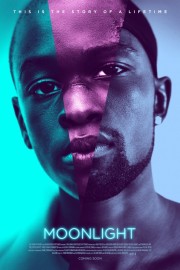Moonlight
Barry Jenkins’s “Moonlight” is similar to Richard Linklater’s “Boyhood,” in that it follows the life of a boy to a man, and how it transforms along the way. The big difference is that the protagonist of “Moonlight,” Chiron, is played by multiple actors rather than a single actor filmed over twelve years. The effect is the same, however, in that we get a full, layered look at an individual who is in the middle of figuring out who he is, and what that means. As great as Linklater’s approach was, however, Jenkins’s film has a depth and power that’s sad and riveting to watch.
Jenkins splits his film into three chapters- “Little,” “Chiron,” “Black.” Each is a name, or nickname, Chiron goes by in the respective chapter. When we first meet him, he is a young boy, and he is being bullied by some kids he goes to school with. He finds a safe place to hide out from them in the form of an apartment that he will learn is run by Juan (Mahershala Ali, in a standout performance), a drug dealer. Chiron (played here by Alex R. Hibbert) doesn’t say much, but Juan does get him to go to his home, where we meet Teresa (Janelle Monáe), for the night, before he finally tells Juan where he lives so he can be taken back to his mother, Paula (Naomie Harris), in the morning. It turns out that mom is one of Juan’s best clients, although it’s wrong to paint Juan as a bad guy based on how he makes his living. Juan will serve as a father figure for Chiron, helping him figure out how to be a man and to grow up a good one, while Teresa will be a caring mother than Chiron’s own mother is incapable of being. These are the seeds from which the rest of the film, the story of which was thought up by Tarell Alvin McCraney, and scripted by Jenkins, will blossom.
In the next chapter, Chiron (Ashton Sanders) is a teenager. He still spends time with Teresa and Juan, while Paula is still dealing with her drug habit and largely ignoring her son. Chiron continues to be bullied by classmates, and he struggles with trying to figure himself out. In high school, there’s a lot of pressure to be able to do that, and there’s a friend of Chiron’s, Kevin (Jharrel Jerome), who has a vested interest in doing so. They share a particular moment of intimacy that is lovely and beautifully handled by Jenkins and performed by the actors. It’s an emotional milestone for Chiron, although the impact of it is going to be blunted when one of the biggest bullies in school, who has terrorized Chiron for years, gets Kevin to do something terrible to Chiron. That will be an equally significant moment for Chiron, and the last time he and Kevin see each other is when Kevin watches him being taken away by police for retaliating in class.
In the final chapter, Chiron (Trevante Rhodes) is now in his 20s. He is on his own, although we see him visit his mother, who now spends her days in rehab, not only for herself, but helping others, as well. They moved to Atlanta. One night, out of the blue, Kevin (André Holland) reaches out to Chiron, and hopes to see him sometime to catch up. Chiron makes his way out to see Kevin at the diner he works at one night, and the two pick up as if no time had passed at all. Now, Kevin is married with kids, while Chiron is still alone, but there’s obviously still a connection the two feel towards one another. That experience they shared as a teenager still means something to both of them, even if it was followed by unpleasantness and bullying. That doesn’t matter now, though, because they aren’t the same people they were in that moment. That doesn’t mean they know who they are, exactly (especially Chiron), but they know some things matter more than the past.
I was really exhausted while watching the film, which I saw on Monday, but held off reviewing it in hopes of my thoughts coalescing into something worthy of sharing. I’m glad I did, because the more I considered the film, the stronger my feelings became for it. Jenkins has a clear, beautiful vision for this film, and he uses cinematography, music and editing as key parts of his storytelling process when it comes to bringing this film to life. The three chapters, and how they fit into the life of Chiron, is an important part of Jenkins’s overall effect, because the film deals with self-discovery and identity in a very direct, poignant way. This was easier for Linklater in “Boyhood” because he had one actor playing the same character over the years, but that highwire act only makes me appreciate how well a multi-actor role like Chiron ends up in a typical narrative film. Hibbert sets the template for the character, which Sanders builds on before it is finished by Rhodes with haunted eyes and a demeanor that flies in the face of what we typically see as a black man who was raised on the streets, and struggled mightily in life, in movies. This is a collaborative effort between director and actors, and it results in one of the most substantial cinematic experiences of the year, not because it does anything in particular different from anything that’s come before, but because it does what it sets out to do with clarity and compassion that we can’t help but feel for the lives on-screen as we are watching it.










